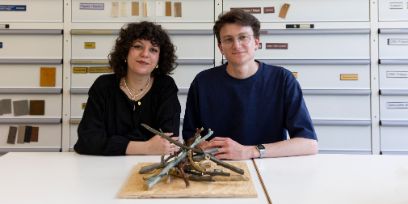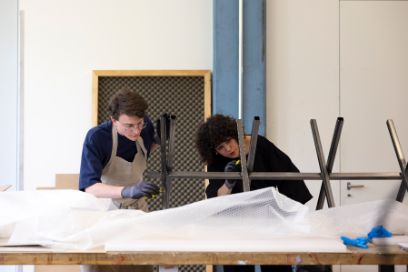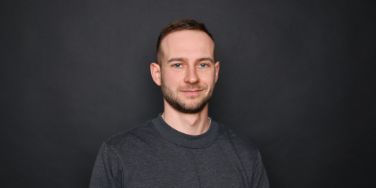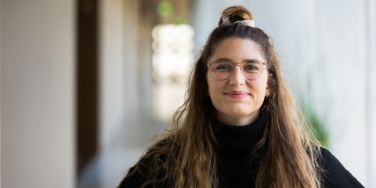- Story
Interview with HKB students Lyna Beggah and Alessandro Ferrari
13.06.2025 Artist duo Lyna Beggah and Alessandro Ferrari are studying Contemporary Art Practice in their last year at HKB. They talk about their master's project displayed at the CAP-Festival.

2022 Lyna Beggah and Alessandro Ferrari formed an artist duo. Both completed their bachelor’s degrees at the Ecole de design et haute école d’art du Valais before continuing their studies at the HKB. They are now approaching the final stage of their master’s project. We met up with the duo in the Werkstatt at Fellerstrasse where they were working on a large metallic construction for their project.
You’re finishing your master's program this summer. What will stick with you from the past years at HKB?
Alessandro: Good question. (Adressing Lyna) Do you want to answer?
Lyna: I don’t know. Do you want to?
Alessandro: For us the most impacting thing at CAP was the relationships we developed with other people from our class and our mentors, who accompanied our artistic projects. Another purpose of starting the master was to …
Lyna: … develop our practice as a duo. To develop more projects together as a duo. Because before coming to CAP we had done only a few projects together. We had the opportunity to continue to work together as well as to work with other artists. So, it was a very interesting experience for us.
Alessandro: Yeah, all the space that the CAP gave us to actually experiment and do a lot of things together. Also, new experiences, such as writing the thesis, were really good.
"It’s a story about sacrifice, resilience, and resisting oppression."
Can you tell us something about the meaning of the project?
Lyna: I was reading a book called “The Colonial trauma” by Karima Lazali that thematizes the violence of the French settlers in Algeria. In this book I discovered an event from 1880, where French settlers decided to give new family names to all the indigenous tribes living in Algeria, to separate the people from their history, their traditions and their knowledges, to have more control over them. After speaking with my family, I discovered that my original family name was “Beni Foughal”. The name comes from a tribe that lived in the forest near the city of Jijel on the east coast of Algeria, where my parents came from. When the French settlers arrived, they seized the forest and began logging operations, forcing the indigenous tribe to work for them.
My family didn’t know much about the Renaming, but they directed me to the website benifoughal.com where I found much information about the tribe of my ancestors. One year after the renaming there was an interesting event. Maybe you can continue?
Alessandro: Did you already talk about the fires? No? Ok, so we’re mainly working on a big installation, which is made from different sculptures and text. The main piece will be about six to seven small fires, made from ceramics. In this part, the installation depicts the large fires that occurred in 1881 – one year after the Renaming, like Lyna said – that burned down the forests between the cities of Béjaïa and Jijel. The fires were probably started by indigenous tribes living throughout the forest because they began sequentially, suggesting that a signal was given to start them simultaneously. On the website we found documentations of this event from the newspaper « Le monde Illustré » which was published in September 1881. We find this story very touching: the indigenous people used the fires in the forest to attack the French settlements, sacrificing their own territory and using it as a weapon against the occupiers. So, it’s a story about sacrifice, resilience, and resisting oppression.
The other part of the installation brings us back to the troubled recent history of Algeria and the present time. Two metal barriers symbolize military or police roadblocks. Lyna's father went back to the forest with some of his uncles to search for properties they still had, and they stumbled upon a military base. It was important to us to show that the forest is still not completely accessible to the original indigenous people who lived there for centuries and that the colonial scars are still visible in the present times.
Do you have a specific goal for this project?
Alessandro: I think this project is strictly correlated to what we already worked on during the master thesis, and it has a lot to do with identity and decolonisation. Research around the theme of decolonisation and the “myth of modernity” was one of the focus points of the thesis at first and now the installation we’re working on. Although we come from really different backgrounds, through research around our personal stories we found a lot of common points throughout developing this project.
Lyna: We were also focusing on a sentence from a book called “A programme of absolute disorder” by Françoise Vergès. She had this beautiful sentence that speaks about living within the ruins. It is something that has interested us since the beginning of the project.
Alessandro: The sentence was sort of a mantra that we worked with in the thesis and continue to work with in the project. How can you live in the ruins? How can you not feel hopeless …

What was the biggest difficulty in the process for your master's project so far?
Alessandro: I think the biggest difficulty was finding the right form. We had wanted to put everything into the project. But of course, that is not possible. In artistic studies we would say to reduce, minimalize and reduce again. You need to summarize, to reduce. That's really hard, because deciding what stays in the project and what must go has the potential for conflict.
On how many projects did you work together so far?
Alessandro: I think we did eight to nine projects together. Ah, you want to count.
Lyna (counts the projects with her fingers): Yeah, to be precise. So, we made seven projects together. And I think, the challenges we face, like Alessandro said, there are a lot of discussions about what we want to do and what is important for each of us. Both of us need to make compromises so we can both be happy with the results. We discuss a lot; it's part of the process. Sometimes we just spend the whole day discussing about the project and in the end of the day we are like: Oh my God, the project is taking too much time from our free time. It’s hard sometimes to separate the work from our free time.
The Installation by Lyna and Alessandro will be exhibited at the CAP-Festival « On ne peut pas cacher le soleil » in Bienne from 19th to 25th June.




